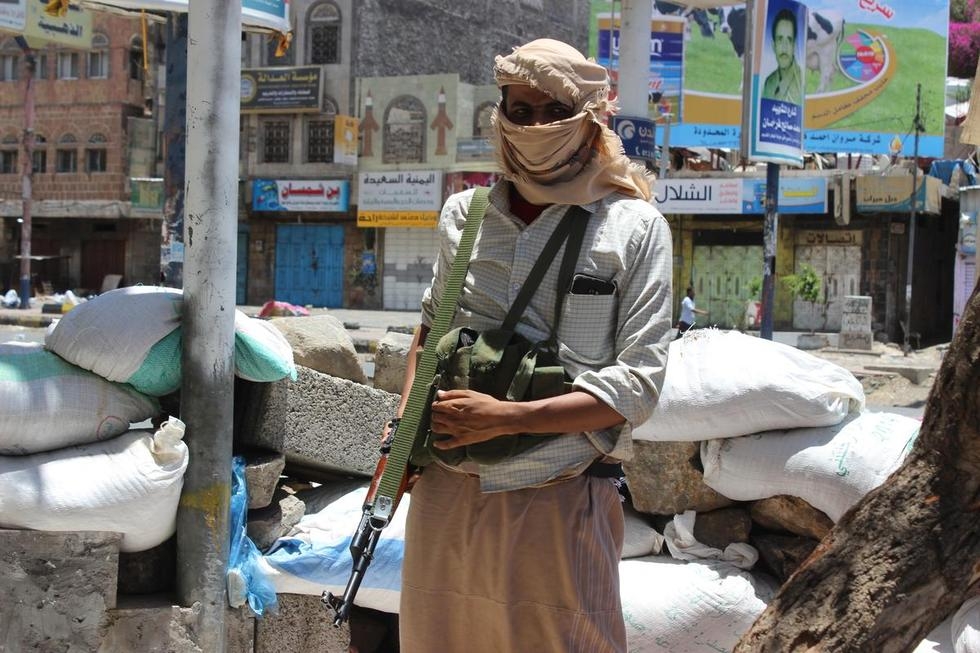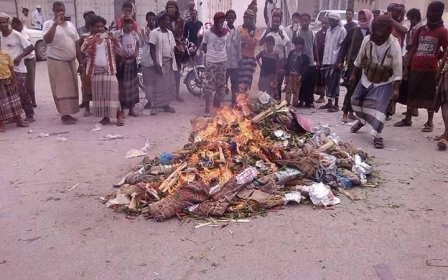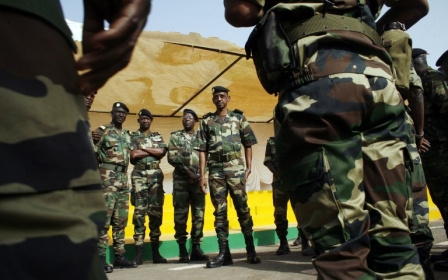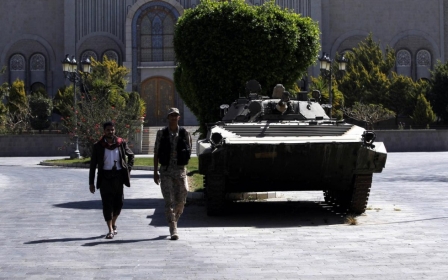Taiz residents call for return of airstrikes as Houthis advance on city

SANAA - When Saudi Arabia announced earlier this month that there would be a truce in Yemen to allow aid into the country, Yemenis received the news happily, hoping to get much-needed food, fuel and other supplies.
But in Taiz, a city of around 500,000 in southwest Yemen, the truce which began on Tuesday has not delivered the outcome they expected. The Houthis have continued to shell the city, often described as Yemen's cultural capital, in the foothills of the Sabr Mountain and conditions have been worsening when MEE talked to locals on Thursday.
"When the truce came into force, the Houthis intensified shelling the city, because there were not any airstrikes which could stop them,” said Esam Abas, a 56-year-old resident in the city’s Al-Kamb neighborhood.
In Taiz, Abas said residents feel like victims of what they describe as a "so-called" truce. Abas and others remain confined in their homes, feeling it is too unsafe to leave, he said.
"We cannot talk about violation of truce in Taiz because we did not have it,” Abas said.
New MEE newsletter: Jerusalem Dispatch
Sign up to get the latest insights and analysis on Israel-Palestine, alongside Turkey Unpacked and other MEE newsletters
They are now calling for the return of Saudi-led airstrikes to reduce Houthi attacks on civilian homes.
Twenty-four hours after the truce started on Tuesday, the Houthis started using different kinds of weapons including artillery and tanks to attack the city, targeting several areas including Al-Hasib and Al-Morour.
The Houthis were reinforced by Yemeni troops loyal to the group who arrived on Wednesday night from Ibb province, just north of Taiz, Fareed Al-Homaid, a journalist based in Taiz, told MEE.
In the current battle, the Houthis could take over some neighbourhoods which have been, up until now, under the control of a local popular resistance group, including what’s called in Taiz the 40-metre street and Al-Zonooj Mountain, Al-Homaid said.
"The Houthis are fighting in Taiz alongside their allies in the military, while the popular resistance have only their own weapons, so it is difficult to the popular resistance to fight Houthis,” he said.
Locals have been killed in the fighting that began after the truce, but figures were not immediately available, al-Homaid said.
‘A political lie’
Hamdi Nabil, a 27-year-old resident in Taiz’s Al-Hasib area, said that the truce is a political lie.
"No one can account for the violations of Houthis so I wish that this is the last truce with the Houthis, because it has increased our suffering," Nabil told MEE quickly over the phone, afraid the battery of his mobile phone, which has become difficult to recharge in the fuel-poor situation, would run out.
Nabil is a construction worker and he has never been particularly interested in politics. However, now he said, he feels its effects: "One day is enough to test the truce; the Houthis did not commit to the truce that means the airstrikes should come back.”
Many in Taiz, like Nabil, now find themselves in limbo, grasping at temporary solutions to live through the clashes. He said he wants a final solution to the clashes so the city can live peacefully.
Not all of Taiz's residents are anti-Houthi. There are some who support the group, often belonging to a group called the Hashemites, a term used to describe descendants of the Prophet Mohammed.
One Houthi supporters in Taiz City, Zuhair Ali, told MEE that the war in Taiz is between the Houthis, which he described as the country’s legal government, and the popular resistance movements. So technically, Ali argued, the current battle falls outside the bounds of the truce.
Ali believes that all Yemenis should be loyal to the Houthis, who led a revolution against the former government, he said, referring to the Houthi takeover of Sanaa last September that eventually led to the resignation and flight from the capital of President Abd Rabbuh Mansour Hadi.
On the other side, there is the popular resistance group in Taiz, led by Hamoud al-Mikhlafi, a prominent sheik with the Islah party in Taiz.
Nael al-Masah, a supporter of al-Mikhlafi, told MEE: "Houthis do not respect the agreements and they do not understand what is the meaning of truce.”
However, al-Masah said he is confident that the popular resistance can defeat the "invaders" of Taiz with the help of Taiz residents.
No break in fighting
In a statement carried by the official Saudi Press Agency, the coalition said: "The Houthis militias have violated the truce." The statement said there had been 12 violations of the ceasefire, including the fighting in Taiz.
"There has been no break whatsoever in the fighting until now, and the people of Yemen need a respite," Sitara Jabeen, spokeswoman for the International Committee of the Red Cross (ICRC) in the Middle East, told Reuters on Wednesday.
The Houthi’s al-Maseerah TV channel said on Wednesday night that the Saudi-led warplanes still hover over different provinces. The channel did not discuss violations of the truce.
Ali al-Qahoom, a member of the Houthis' political office in Sanaa, told MEE that the Saudi-led coalition violated the truce on Wednesday by targeting areas in the northern Sadaa province including Alboqe and al-Minzalah areas, in addition to airstrikes targeting Houthis in the Lawder district in the southern province of Abyan.
"The clashes in Taiz, Al-Dhale and Abyan did not stop because ‘Daesh’ still want to take the control of new areas,” al-Qahoom said, using the Arabic name for the Islamic State militant group of which Houthis accuse their opponents of being members.
The UN envoy to Yemen, Ismail Ould Chieck Ahmed, told the journalists on Thursday in Sanaa airport that the truce is still going in a positive way, even if there is a violation. He refused to say who violated the truce.
Managing editor of Al-Tagheer news website, Mohammed al-Hassani, told MEE that both sides will try hard to use the five-day truce to their advantage.
In the last two years, the Houthis violated several truces between the group and local tribes in different conflict zones such as al-Jawf, Imran and Dammaj, because they thought that their enemies cannot continue fighting in these conditions, al-Hassani said.
"In any country, the people ask to extend the truce,” al-Hassani said. “However, Taiz residents call for cancelling the truce, as it is not real."
Middle East Eye delivers independent and unrivalled coverage and analysis of the Middle East, North Africa and beyond. To learn more about republishing this content and the associated fees, please fill out this form. More about MEE can be found here.




